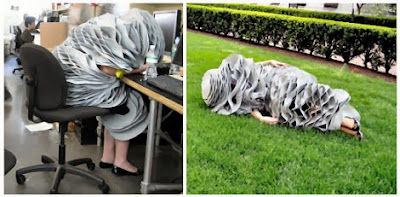Tired? You're not alone. About 20 percent of Americans get fewer than six hours of shut-eye nightly, and a growing number have to rely on sleep aids to fall asleep or stay that way, according to the National Sleep Foundation. Is getting more (and better) sleep possible without the help of drugs? To find out, we asked three Woman's Day staffers to share their nighttime troubles with the experts. Here's what they learned.

Forrest Jessee designed the sleep suit.
The project attempts to challenge the idea of personal space in relationship to the human body and its surrounding environment. It is inspired by Buckminster Fuller's practice of Dymaxion Sleeping, which involves four 30-minute naps over a period of 24 hours, and the material requirements for such conditions.
Architecturally, the very close relationship between the human body and the suit acts as the generator of form as well as tool to negotiate between the occupant and his or her surroundings. The structure of the material, a structural pleat, is used as a means to create feelings of connected and disconnectedness as well as provide varying levels of support for different parts of the body.
Tags:
In order to survive, animals must be able to learn from experience, and understanding the biology of this process remains an open scientific question. Previous research has demonstrated that sleep plays in important role in vocal learning in birds, and is also important for stabilizing memories in humans.

DAYTON, OH—Every single person, historical figure, and anthropomorphic talking object inhabiting Brian Jensen's dream Friday night was suddenly struck by the unusually strong smell of smoke, subconscious sources reported.
Tags:
- dreams,
- landscapes,
- lol,
- sleep
I don't know you, but I can bet while you're reading this, you're feeling tired. No, I don't have Santa's omnipotent powers, but according to the statistics, you're skimping on sleep. Nearly 60 percent of you log fewer than the seven to eight hours a night that's best for your brain and body, according to a Self.com poll, and more than 15 percent of you get by on fewer than six.
Tags:
.